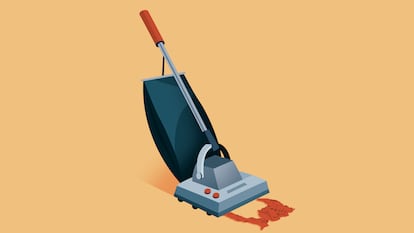Haitian immigrants don’t eat pets. It’s the international community that is ‘eating Haitians’
US arms traffickers are flooding the country with guns and automatic rifles that are used to murder thousands of people

There is no allegation or evidence that Haitian immigrants in Ohio have eaten any of their white neighbors’ pets, a hoax spread by presidential candidate Donald Trump and supported by the entire network of media outlets pushing the former president’s campaign. Where there may be no pets left is in Haiti itself. According to the latest report from the World Food Program, 5.4 million people are struggling to feed themselves and their families every day, representing one of the highest proportions of people facing acute food insecurity in any global crisis. Of these, two million face extreme food shortages, malnutrition and disease.
Haiti is in chaos, subjected to violence by armed gangs that have caused 4,789 homicides and 2,490 kidnappings so far this year. Since there are no weapons or ammunition factories on the island, all the weapons available to these gangs come from the United States, and specifically from Florida. Although international organizations have asked the United States to prevent this trafficking, nothing seems to be done about it, at least not effectively enough. Thus, Haitian immigrants in the United States do not eat their neighbors’ pets, but some American arms dealers are flooding Haiti with thousands of guns and automatic rifles that are killing not pets but people, by the thousands.
U.S. relations with Haiti have always been unhappy. In 2010, former U.S. President Bill Clinton did something unusual: he apologized for having forced Haiti to reduce tariffs on imported American rice, which was subsidized by Washington and destroyed domestic production. “It may have been good for some of my rice farmers in Arkansas, but it didn’t work. It was a mistake.” It was. Haiti lost the ability to produce one of the most important crops for feeding its population. Only because the U.S. president wanted to help Arkansas farmers get rid of their surplus. “I have to live with the consequences of what I did,” said a rueful Bill Clinton, but those who lived with the consequences were the millions of Haitians he had plunged into misery. That same Clinton had helped restore Jean-Bertrand Aristide, the politician and priest ousted from power by a military coup, to the democratic office of the Haitian presidency. Clinton knew the country well. He spent part of his honeymoon there, when he married Hillary Rodham in 1975 (at the time, the son of dictator Jean-Claude Duvalier was in power). But nothing prevented him from destroying its agricultural capacity in one fell swoop.
Things went very badly for the United States very quickly. In 1914, Washington sent a gunboat with marines to simply steal the gold from the National Bank of the Republic of Haiti. Eight marines broke into the bank’s headquarters, stole half a million dollars’ worth of gold at the time, and returned to the United States, where they deposited the bullion in the National City Bank. The National Bank of Haiti was owned by American shareholders, so when they needed the money they simply turned to the gunboat. Haiti’s relations with France were no better either. As the BBC reports, 220 years ago Haiti became the first independent nation in Latin America, the oldest Black republic in the world, and the second oldest republic in the Western Hemisphere after the United States. All this was achieved after the only successful slave revolt in human history. However, in order to be recognized as independent, Haiti had to pay 150 million francs (around $21 billion at current value) to France in compensation for the property (and slaves!) that the French had lost. A unique case in which the colonized person did not receive compensation, but rather the opposite. One might think that the U.N. or the international community would make up for such a blunder. But Duvalier Sr., the bloody dictator, remained in power for 14 years, until his death in 1971, without anyone bothering him, as everyone seemed delighted with his reign of terror against Caribbean communism. After the earthquake in 2010, the U.N. tried to help the country rebuild, but it got off to a very wrong start: the blue helmets brought with them a fierce cholera epidemic and were accused of rape and abuse.
So, if you look back, it wasn’t the Haitians who ate anyone’s pets, it was everyone else who ate their resources.
Sign up for our weekly newsletter to get more English-language news coverage from EL PAÍS USA Edition
Tu suscripción se está usando en otro dispositivo
¿Quieres añadir otro usuario a tu suscripción?
Si continúas leyendo en este dispositivo, no se podrá leer en el otro.
FlechaTu suscripción se está usando en otro dispositivo y solo puedes acceder a EL PAÍS desde un dispositivo a la vez.
Si quieres compartir tu cuenta, cambia tu suscripción a la modalidad Premium, así podrás añadir otro usuario. Cada uno accederá con su propia cuenta de email, lo que os permitirá personalizar vuestra experiencia en EL PAÍS.
¿Tienes una suscripción de empresa? Accede aquí para contratar más cuentas.
En el caso de no saber quién está usando tu cuenta, te recomendamos cambiar tu contraseña aquí.
Si decides continuar compartiendo tu cuenta, este mensaje se mostrará en tu dispositivo y en el de la otra persona que está usando tu cuenta de forma indefinida, afectando a tu experiencia de lectura. Puedes consultar aquí los términos y condiciones de la suscripción digital.









































